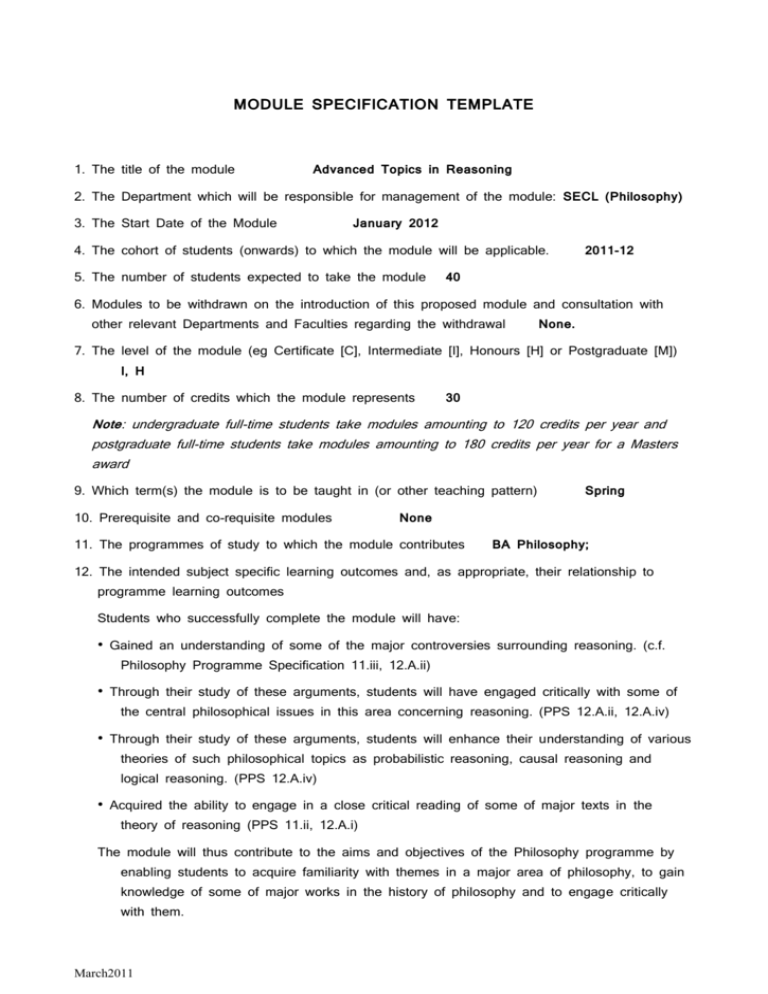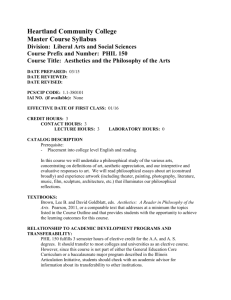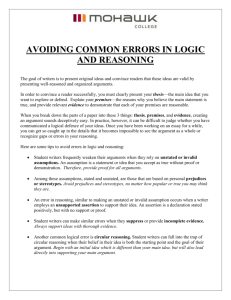University of Kent at Canterbury
advertisement

MODULE SPECIFICATION TEMPLATE 1. The title of the module Advanced Topics in Reasoning 2. The Department which will be responsible for management of the module: SECL (Philosophy) 3. The Start Date of the Module January 2012 4. The cohort of students (onwards) to which the module will be applicable. 5. The number of students expected to take the module 2011-12 40 6. Modules to be withdrawn on the introduction of this proposed module and consultation with other relevant Departments and Faculties regarding the withdrawal None. 7. The level of the module (eg Certificate [C], Intermediate [I], Honours [H] or Postgraduate [M]) I, H 8. The number of credits which the module represents 30 Note: undergraduate full-time students take modules amounting to 120 credits per year and postgraduate full-time students take modules amounting to 180 credits per year for a Masters award 9. Which term(s) the module is to be taught in (or other teaching pattern) 10. Prerequisite and co-requisite modules Spring None 11. The programmes of study to which the module contributes BA Philosophy; 12. The intended subject specific learning outcomes and, as appropriate, their relationship to programme learning outcomes Students who successfully complete the module will have: • Gained an understanding of some of the major controversies surrounding reasoning. (c.f. Philosophy Programme Specification 11.iii, 12.A.ii) • Through their study of these arguments, students will have engaged critically with some of the central philosophical issues in this area concerning reasoning. (PPS 12.A.ii, 12.A.iv) • Through their study of these arguments, students will enhance their understanding of various theories of such philosophical topics as probabilistic reasoning, causal reasoning and logical reasoning. (PPS 12.A.iv) • Acquired the ability to engage in a close critical reading of some of major texts in the theory of reasoning (PPS 11.ii, 12.A.i) The module will thus contribute to the aims and objectives of the Philosophy programme by enabling students to acquire familiarity with themes in a major area of philosophy, to gain knowledge of some of major works in the history of philosophy and to engage critically with them. March2011 13. The intended generic learning outcomes and, as appropriate, their relationship to programme learning outcomes Students who successfully complete the module will have (PPS 12.B, 12.C): • Developed their skills in analysis • Engaged in philosophical argument, both oral and written • Developed their skills in critical analysis and argument through their engagement with these texts, through their reading, writing and discussion with others in seminars. • Shown ability to work alone and to take responsibility for their own learning • Developed their ability to clarify complex ideas and arguments, to develop their own ideas and arguments, and to express them orally and in writing. The module will thus contribute to the aims and objectives of the Philosophy programme by enabling students to develop their analytical and critical skills and their skills in oral and written argument. 14. A synopsis of the curriculum The module will cover some of the major topics of the theory of reasoning, with a focus on presenting students with new and exciting research. The syllabus will vary from year to year. The approach will be philosophical and critical, and may involve the close reading of texts. Students will be expected to engage critically with the works being studied and to formulate and argue for their own views on the issues covered. As an indication of the kind of topics covered, the following are three potential syllabi, one of which might operate in any particular year: 1. Probability and probabilistic reasoning. This syllabus will present the major interpretations of probability and their connection with the various kinds of probabilistic reasoning. Topics covered might include: the classical interpretation; the logical interpretation; the subjective interpretation; the frequency interpretation; the propensity interpretation; the objective Bayesian interpretation. The key text will be D.A.Gillies (2000): Philosophical theories of probability, Routledge. 2. Causality and causal reasoning. This syllabus will present the major theories of causality, including difference-making theories (probabilistic theories, counterfactual theories, agency theories), mechanistic theories (process theories, complex systems theories) and pluralist theories. It will go on to consider methods of causal reasoning in the sciences and the implications of such methods for the metaphysics of causality. In the absence of a comprehensive text, this syllabus will appeal to papers, especially those in the Oxford Handbook of Causation (OUP 2009), and Causality in the Sciences (OUP 2011). 3. Invalid arguments. This syllabus will look in detail at methods of assessing the cogency of deductively invalid arguments. In particular it will present the methods of inductive logic for assessing the plausibility of arguments. It will provide an introduction to probabilistic logics and their semantics, as well as to methods of March2011 inference in probabilistic logics, with a focus on elementary methods that can be readily acquired by students with little prior training in logic and no prior knowledge of probability theory. In the absence of a text at a suitable level, this syllabus will be accompanied by a set of detailed lecture notes. 15. Indicative Reading List Please see the above syllabi. 16. Learning and Teaching Methods, including the nature and number of contact hours and the total study hours which will be expected of students, and how these relate to achievement of the intended learning outcomes. Study will take the form of 3 contact hours per week and 17 hours per week of self study: 2 hours of core lectures per week. The lectures will provide students with the overall framework and an understanding of the central issues to be covered. 1 hour of seminar per week. Seminars may include student presentations and discussion of the lecture topics and background reading. These seminars will enable students to engage in in-depth analysis of texts and arguments and will help students to develop their skills in philosophical analysis. Students will be expected to study for approx. 17 hours per week on the module in addition to contact hours. Total study hours 300 17. Assessment methods and how these relate to testing achievement of the intended learning outcomes The module will be marked by continuous assessment only, there will be no final examination. Students will be required to write one essay of up to 3000 words, which will account for 80% of their total marks. (An in-class assignment may be substituted for the essay if more appropriate to the topics covered, for example in the Invalid arguments syllabus outlined above.) The remaining 20% will be an assessment of seminar performance. The essay will normally be single marked and moderated. The module will also include some formative assessment: students writing an essay will be given the opportunity to hand in a detailed essay plan of up to 1000 words; this will receive feedback but will not be marked. The essay/ICA will assess students' knowledge and understanding of the material as well as their ability to engage in critical analysis and argument, and to present independent ideas. The mark for seminar performance will reflect students' ability to engage clearly and effectively in oral discussion and argument. At the end of the course students will be asked to complete the standard course evaluation questionnaire. On the basis of the replies, and of comments from the external examiner, a report on the module will be contributed to the Annual Monitoring and Evaluation Report for the Philosophy programme. Essay/ICA questions will differentiate between level I and level H in assessment. Those at a higher level will be harder in the sense that an answer to a higher level question will need to demonstrate one or more of: March2011 (i) greater clarity and soundness of argument structure, (ii) a more acute critical analysis of the material (e.g., greater depth of argument), (iii) a stronger research ability (e.g., wider references). 18. Implications for learning resources, including staff, library, IT and space Staffing will be provided from the existing resources of the Philosophy Department in SECL. The library will need to order further copies of key course books. No special implications for new IT or space resources are anticipated. 19. A statement confirming that, as far as can be reasonably anticipated, the curriculum, learning and teaching methods and forms of assessment do not present any non-justifiable disadvantage to students with disabilities As far as can be reasonably foreseen, there will be no non-justifiable disadvantages that students with disabilities will experience on this course. People with special needs will be asked to make themselves known to the teacher, by indicating on their essays, or by contacting the teacher in other ways, and to discuss with the teacher how best to meet their needs. For example, by making special provisions when setting deadlines, marking written work, by allowing extra time and special conditions in which to complete examinations, etc. Attempts will be made to ensure access in case of problems, and that communications are not problematic for students with sensory impairments. It is thus confirmed that, as far as can be reasonably anticipated, the curriculum, learning and teaching methods and forms of assessment do not present any non-justifiable disadvantage to students with disabilities. If the module is part of a programme in an Associate College, please complete the following: 20. Associate College: 21. University Department (for cognate programmes) or Faculty (for non-cognate programmes) responsible for the programme: March2011









